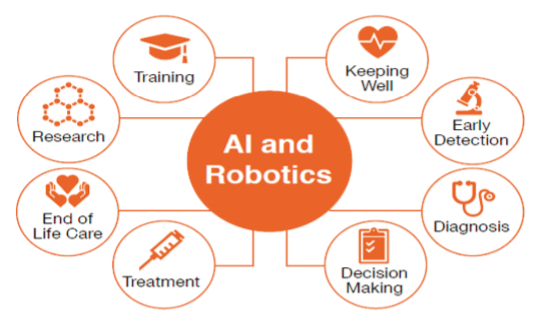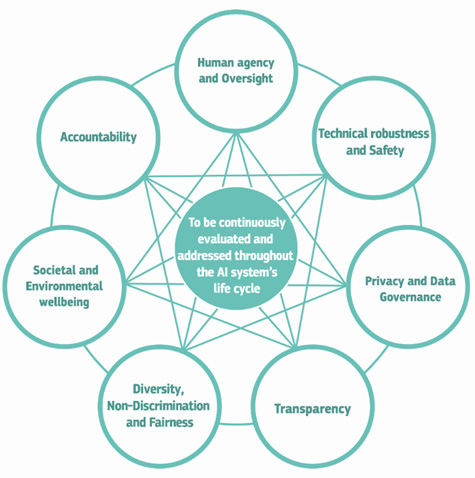Ethical Challenges over Artificial intelligence
2023 JAN 12
Mains >
Science and Technology > Digital Technology > Innovation and New technologies
IN NEWS:
- Microsoft is reportedly in talks to invest USD 10 billion into AI research powerhouse OpenAI. OpenAI has been the centre of media attention in recent times, following the launch of its product ChatGPT, the AI chatbot capable of producing human-like answers to user queries.
- The exponential growth of generative Artificial Intelligence (AI) is raising several ethical questions and increasing the need for ethical guidelines.
ARTIFICIAL INTELLIGENCE:
- Artificial intelligence (AI) is an inter-disciplinary branch of science concerned with building smart machines capable of performing tasks that typically require human intelligence.
- The term was coined in 1956 by John McCarthy, who is dubbed as the ‘Father of AI’.
- In simple terms, AI refers to the ability of machines to perform cognitive tasks like thinking, perceiving, learning, problem solving and decision making. AI makes it possible for machines to learn from experience, adjust to new inputs and perform human-like tasks.
- Generative AI is a cutting-edge technological advancement that utilises machine learning and artificial intelligence to create new forms of media, such as text, audio, video, and animation.
For detailed article on Artificial intelligence: http://www.ilearncana.com/details/INDIA-AND-ARTIFICIAL-INTELLIGENCE/561
APPLICATION OF AI:
- Agriculture:
- Some use cases include improvement in crop yield through real time advisory, advanced detection of pest attacks, and prediction of crop prices to informed sowing practices.
- It also has the potential to address challenges such as inadequate demand prediction, inefficient irrigation and irrational use of pesticides and fertilisers.
- Manufacturing:
- AI is poised to be the engine of the Fourth Industrial Revolution. AI can create and simulate complex engineering, design, and architecture, demand forecasting, cost effective production, predictive maintenance and increased asset utilisation, quality assurance and warehousing.
- Eg: GitHub, Copilot6 and ChatGPT1 can generate code in real-time and even fully functioning modules, thereby improving developer productivity.
- Security:
- AI can be used for border control tasks, including border surveillance, detecting cross-border crime patterns, search and rescue, intelligence gathering, drone surveillance etc.
- Several governments have already begun testing AI for better law enforcement, regulate immigrations, spot potentially dangerous travelers and detect smuggling at their borders.
- Policy making:
- AI helps in analyzing large volume of data and develop targeted policies, thereby improving the efficiency of policies and use of public resources. This can help overcome the ‘one-size-fits-all’ approach in socio economic development.
- Healthcare:
- AI systems are being utilised in the early detection of different diseases. They can also can generate potential and alternative treatments personalised to patients’ symptoms and medical history.
- Eg: AI-based computer programs have been used to help doctors interpret mammograms for more than 20 years and detect breast cancers at early stages.
- Eg: DeepMind AlphaFold can predict the 3D models of protein structures and thereby accelerate research.

- Education and Skilling:
- Potential use cases include enhancing the learning experience through personalised learning, automating and expediting administrative tasks, and predicting the need for student intervention to reduce dropouts.
- Energy:
- Potential use cases in the energy sector include energy system modelling and forecasting to increase efficiency in power balancing and reliability.
- AI can also enable storage of energy through intelligent grids enabled by smart meters, and also improve the reliability and affordability of energy.
- Smart Mobility:
- Potential use cases in this domain include autonomous fleets for ride sharing, semi-autonomous features such as driver assist, and predictive engine monitoring and maintenance.
- Other areas that AI can impact include autonomous trucking and delivery, and improved traffic management.
- Smart Cities:
- Integration of AI into cities and infrastructure could help meet the demands of a rapidly urbanising population and providing them with enhanced quality of life. Potential use cases include traffic control to reduce congestion and enhanced security through improved crowd management.
- Retail:
- The retail sector has been one of the early adopters of AI solutions, with applications such as improving user experience by providing personalised suggestions, preference-based browsing and image-based product search.
- Other use cases include customer demand anticipation, improved inventory management, and efficient delivery management.
- Legal:
- Generative artificial intelligence can sift through numerous legal research materials and produce a pertinent, specific, and actionable summary. As a result, it can reduce human effort and enable them to focus on more complex problems.
ETHICAL ISSUES OVER AI:
- Privacy and security:
- AI systems function on the availability of data. While privacy laws call for individual consent to use data, most people are unaware of how their data is collected, how they are processed or how they are used to impact their day-to-day life.
- Unemployment:
- AI bring in automation, which can lead to large scale unemployment. According to the McKinsey Global Institute report, by the year 2030, about 800 million people will lose their jobs to AI-driven robots.
- Wealth Inequality:
- Our economic system is based on compensation for contribution to the economy, often assessed using an hourly wage. But AI systems can work at 100% at very low upkeeping cost. This opens the door for corporate tycoons and stakeholders to generate more profits, leading to greater wealth inequality.
- Bias and discrimination:
- If the models are trained on biased, non-inclusive data, they will generate biased outputs.
- For eg: Amazon scrapped an AI tool to hire after discovering it discriminated against women.
- Effect on human judgment:
- Machines are increasingly becoming a part of our day-to-day life and impacting our free will. Nefarious actors may use AI-generated media to manipulate people and influence public opinion.
- Misinformation:
- Generative AI systems can create content for malicious purposes, such as deepfakes, disinformation, and propaganda.
- Accountability:
- AIs are software that writes its own updates and renews itself. This means that the machine is not created to do what we want it to do — it does what it learns to do. Hence, there are chances of unintended consequences. But the question of who should be held responsible in such events remain unanswered.
- Transparency paradox:
- Transparency of AI systems can help mitigate certain problems such as fairness, discrimination and trust. At the same time, greater disclosure of information can make AI more vulnerable to attacks.
- Weaponization:
- With drones playing more of a role in defense, we need to further examine their role and how they are used. Is it better to use AIs to kill than to put humans in the line of fire?
- Treatment of AIs:
- In 2017, the humanoid robot Sophia was granted citizenship in Saudi Arabia. But questions remain as to what rights such machines are entitled to. With further developments on AI, the question of rights of machines are going to become more pronounced.
WAY FORWARD:
- Guidelines for AI: Individual governments must develop regulatory guidelines based on fundamental rights and ethical principles. In this regard, countries can look into the European commission’s ‘The Ethics Guidelines for Trustworthy Artificial Intelligence (AI)’ document which lists out seven key requirements that AI systems should meet in order to be trustworthy.

- Privacy regulations: Legal systems ensuring privacy of individuals, informed consensus of data and transparent data handling is essential to alleviate safety concerns over AI.
- Human centric designs approach should be the central theme in AI developments. In this scenario, a “whole of society” approach to AI governance will enable us to develop broad-based ethical principles, cultures, and codes of conduct.
- Self-regulation is one method to regulate AI. Developers, business entities and users need to adhere to good ethical standards while dealing with AI.
- Global cooperation: A “whole of society” approach to AI governance is essential to enable us to develop broad-based ethical principles, cultures, and codes of conduct.
PRACTICE QUESTION:
Q. Examine the need of ethical guidelines in the field of Artificial intelligence?

